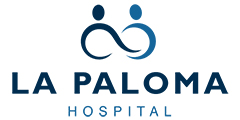En cumplimiento de lo dispuesto en el Reglamento General de Protección de Datos (EU) 2016/679 de Protección de Datos (en adelante “RGPD”), y la Ley Orgánica 3/2018, de 5 de diciembre, de Protección de Datos Personales y Garantía de los derechos digitales (en adelante “LOPDGDD”), le informamos:
Responsable del Tratamiento: HOSPITAL POLICLÍNICO LA PALOMA, S.A., CIF: A35005842, Domicilio: C/ Maestro Valle, 20, 35005, Las Palmas de G.C., Las Palmas, España. Teléfono: 928 234 466. Delegado de Protección de Datos: Lilliam Valenzuela - UMBRA ABOGADOS. Cualquier consulta sobre su privacidad podrá remitirla al email: rgpd@hospitallapaloma.com
Finalidad del tratamiento: Gestión y resolución de su consulta. Gestionar la agenda de citas del Hospital. Remitirle información sobre temas de salud, eventos o promociones en productos o servicios médicos. Gestionar los curriculums que se reciban de acuerdo con los procesos de selección o vacantes.
Legitimación: Estamos legitimados para tratar sus datos en base a su consentimiento, y en base al interés legítimo del Responsable, y, en caso de que remita su currículo, trataremos los datos para la aplicación de medidas precontractuales.
Conservación: Los datos serán conservados por el tiempo necesario para la finalidad con la que se recoge la información, mientras no revoque el consentimiento prestado o solicite la supresión de sus datos, así como por los plazos necesarios para hacer frente a posibles reclamaciones o atender requerimientos judiciales.
Destinatarios: Los datos de los usuarios de la página web no serán cedidos salvo para el cumplimiento de obligaciones legales o requerimientos judiciales.
Derechos: Puede ejercer sus derechos de acceso, rectificación, supresión, portabilidad y oposición o revocación del consentimiento otorgado remitiendo su solicitud al email rgpd@hospitallapaloma.com, por correo postal a la dirección del Hospital, o presencialmente en nuestras instalaciones.
*Le recomendamos consultar la información adicional sobre Protección de Datos.











